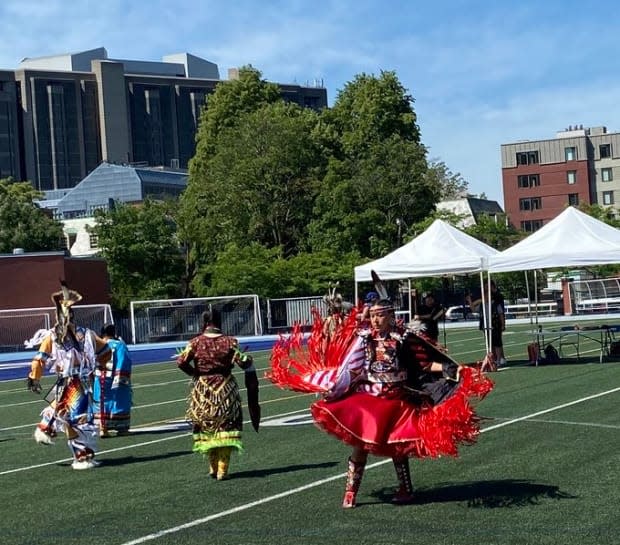Pow wow vaccine clinic features dancing, singing, drumming along with COVID-19 doses in Toronto

Indigenous health-care groups held a pow wow COVID-19 mass vaccination clinic in Toronto on Saturday in the hopes of creating a culturally safe space for First Nations, Inuit and Métis people to get vaccinated.
The clinic, which included Indigenous dancing, singing, drumming and a teepee, was held at the University of Toronto's Varsity Stadium. It ran from 10 a.m. to 4 p.m. The clinic offered Pfizer-BioNTech shots and it had 400 appointments.
Steve Teekens, executive director of Na-Me-Res, Native Men's Residence, which is an emergency homeless shelter for men, said organizers chose Saturday for the clinic because the date is close to June 21, National Indigenous Peoples Day. The University of Toronto offered the venue, its staff members and facilities and helped with logistics, he said.
Teekens said the idea behind the vaccination clinic was to create a culturally safe place for Indigenous people, aged 12 and older, their family members and close contacts to get a first or second dose of Pfizer. Organizers included dancing, singing and drumming at Varsity Stadium to showcase Indigenous cultures in Canada, he said.
"We reached out to various Indigenous pow wow dancers, some Inuit performers and a Métis performer to give people a flavour of various Indigenous cultures across Canada from coast to coast to coast," he said.
Organizers used 'for Indigenous by Indigenous' approach
Teekens said the mass vaccination clinic used a "for Indigenous by Indigenous" approach to make people feel comfortable and to lower barriers to COVID-19 vaccines.
"Cultural safety means creating a place where people of various cultures feel they belong, where they feel safe to go to seek treatment or services," he added.
"Often systematic racism and discrimination are very much factors within many of our mainstream health-care systems. We need to work really hard to change those things."
Waakebiness-Bryce Institute for Indigenous Health, a research institute at the U of T's Dalla Lana School of Public Health, and Auduzhe Mino Nesewinong, an Indigenous COVID-19 testing site, organized the clinic.

Teekens said unhoused Indigenous people in Toronto may face additional barriers to getting vaccinated.
"It's common for homeless indigenous people not to get the best quality services when they seek out health services so we thought if we do a 'for Indigenous, by Indigenous approach' with Indigenous physicians, Indigenous nurses, Indigenous staff to support it, we'll make every effort to make sure that people feel culturally safe coming into our services," he said.
"They'll see people that may look like them, that might even come from their First Nation communities."
Mayor John Tory, who spoke at the opening of the clinic, said vaccine clinics organized by community organizations are helping the city to get people vaccinated and helping people from various communities to overcome vaccine hesitancy.
"Some of the communities across different communities have a little bit more trouble either being comfortable with getting vaccinated, or with having access to the places to get vaccinated," Tory said.
"By putting on these clinics, we can make sure that our Indigenous communities, which at the present time are maybe only half vaccinated, can get vaccinated and provide them with a degree of protection against COVID-19 and the variants that many other people have."

Dr. Janet Smylie, a family doctor and public health researcher, said the organizations essentially created a "gathering place" through the pow wow vaccine clinic. She estimated that there are 95,000 Indigenous people in Toronto.
"We still often, unfortunately, do experience differential treatment when we go to the hospitals. So here, by having our community leaders, our dancers, our singers, it's a safe environment," Smylie said.
"We brought together Indigenous midwives, physicians, nurses, allied colleagues, all working together in a good way to make sure First Nations, Inuit and Metis people can have culturally safe access to COVID-19 vaccine."
The city reported on Saturday that it has administered first doses of a COVID-19 vaccine to more than 75 per cent of adults in Toronto and second doses to more than 25 per cent of adults.
A total of 2,911,071 COVID-19 vaccine doses have been administered in Toronto, the city said.

